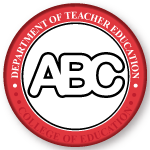Author ORCID Identifier
Jakopovic - https://orcid.org/0000-0002-9554-9201
Document Type
Conference Proceeding
Publication Date
10-2020
Abstract
At the national level, undergraduate mathematics teacher preparation programs are shifting to develop teachers who not only understand current research-informed instructional practices but also have firsthand experiences learning, teaching, and collaborating in student-centered environments (CBMS, 2016). Understanding the degree to which these experiences impact pre-service teachers’ learning is challenging to measure. This paper describes the efforts of a Track 1 National Science Foundation (NSF) Robert Noyce Teacher Scholarship grant to recruit and provide wider professional experiences to develop high-quality secondary mathematics teacher candidates and how the research team utilizes a value framework (Wenger, Traynor, & de Laat, 2014) to study programmatic impact. The guiding questions for this research are: To what extent do pre-service mathematics teachers value participation in extended programs to support their work as mathematicians and future teachers? and How can researchers and practitioners measure value as a construct? This paper examines: (a) how we leverage the value framework in a variety of ways, (b) preliminary findings on what Noyce participants value and the experiences that led to their learning, and (c) implications for future work in pre-service mathematics teacher preparation programs.
Recommended Citation
Gomez Johnson, Kelly and Jakopovic, Paula M., "What’s the Value? Measuring Value in Complex Social Learning Environments with Pre-service Mathematics Teachers" (2020). Teacher Education Faculty Proceedings & Presentations. 39.
https://digitalcommons.unomaha.edu/tedfacproc/39


Comments
Articles published in the Proceedings are copyrighted by the author. Permission to reproduce an article or portions from an article must be obtained from the author.
This was presented at the Ninth Annual Mathematics Teacher Education Partnership Conference and appears in their proceedings (2020 ed., pp. 63-66) as well as presented at the annual meeting of the Mathematics Teacher Education Partnership (MTE-P), Virtual Conference.